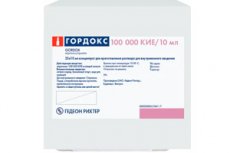新出版物
戈尔多克斯
阿列克谢·克里文科,医学审稿人
最近審查:04.07.2025
最近審查:04.07.2025

Gordox(抑肽酶)是一种蛋白酶抑制剂。蛋白酶是分解蛋白质的酶,它们在体内各种生物过程中发挥作用。抑肽酶在医疗实践中用于多种用途,包括控制手术出血、减少术中失血以及治疗与手术相关的并发症。此外,在某些情况下,它还可以用于减轻炎症和其他组织损伤反应。
適應症 戈尔多克斯
- 控制手术出血:该药可用于减少手术期间的出血,特别是在心脏和血管手术中。
- 减少手术期间的失血量:Gordox 有助于减少手术期间的失血量。
- 手术后并发症的治疗:用于减少手术后可能出现的肿胀、炎症等并发症。
發布表單
Gordox(抑肽酶)通常以注射溶液的形式提供。
藥效學
- 蛋白酶抑制:抑肽酶可阻断体内多种蛋白酶的活性,包括胰蛋白酶、糜蛋白酶和激肽释放酶。这可以防止体内蛋白质分解,在多种医疗情况下非常有用。
- 外科用途:抑肽酶广泛应用于外科手术,以减少失血量并降低手术期间出血的风险。这是通过抑制能够分解血凝块并增加出血的蛋白酶来实现的。
- 在心脏手术中的应用:在心脏手术中,抑肽酶可用于防止出血并降低心脏手术期间血栓形成的风险。
- 牙科用途:在牙科中,抑肽酶可用于减少口腔手术后的出血和促进愈合。
- 其他用途:抑肽酶还可用于治疗烧伤、败血症、胰腺炎和其他与炎症和止血障碍有关的疾病。
藥代動力學
Gordox 的活性成分抑肽酶通常会在体内快速代谢和消除。静脉给药后,其总清除率约为 50 ml/kg/min。它主要在肾脏代谢,但也在肝脏中代谢。约 75% 的剂量以代谢物和未代谢药物的形式经肾脏排泄。对于肾功能不全或高龄患者,由于抑肽酶清除率的改变,可能需要调整剂量。
劑量和管理
Gordox(抑肽酶)的给药方法和剂量取决于医疗目的、患者病情和医生的建议。通常通过静脉注射给药,有时也通过肌肉注射给药。
在懷孕期間使用 戈尔多克斯
数据有限:目前关于妊娠期间使用抑肽酶的安全性数据不足。因此,只有当该药物对母亲的潜在益处大于对胎儿的潜在风险时,才应在妊娠期间使用该药物。
风险与注意事项:
- 抑肽酶的胎儿毒性和致畸潜力尚未得到充分研究,因此在怀孕期间使用它具有潜在风险。
- 如果在怀孕期间必须使用抑肽酶,则必须仔细监测胎儿和母亲的状况,以便及时发现可能出现的并发症。
医生的建议:
- 在怀孕期间使用抑肽酶时应谨慎,并且只有在没有更安全的替代方法来治疗出血或其他需要使用它的医疗状况时才可以使用。
- 如果紧急使用 Gordox,应在严格的医疗监督下进行治疗,并考虑所有预防措施以最大限度地降低风险。
禁忌
- 过敏反应:已知对抑肽酶或该药物的任何成分过敏或过敏的患者应避免使用。
- 怀孕:怀孕期间禁用 Gordox,尤其是在妊娠前三个月,除非其益处大于对胎儿的潜在风险。
- 严重肾功能不全:对于严重肾功能不全的患者,可能禁用 Gordox,因为该药物在体内有毒性蓄积的风险。
- 严重肝功能不全:严重肝功能不全的患者可能禁用Gordox,因为这可能会损害药物的代谢和消除。
- 高凝状态:Gordox 可能会促进凝血功能障碍患者发生血栓栓塞并发症。
- 克罗恩氏病:对于患有克罗恩氏病(肠道慢性炎症过程)的患者,使用抑肽酶可能会使病情恶化。
- 在儿科实践中的使用:关于在儿童中使用 Gordox 的数据不足,因此在儿科实践中使用时需要谨慎并咨询医生。
副作用 戈尔多克斯
- 过敏反应:包括皮疹、瘙痒、皮肤发红,或面部、嘴唇或舌头肿胀。如出现过敏反应,请立即停药并就医。
- 心脏问题:可能包括心律失常(非窦性心律)、心动过速(心率过快)或低血压(血压低)。
- 血液问题:包括血栓形成(血管中形成血凝块)或血栓栓塞(血凝块进入血管)。
- 肾脏问题:肌酐和血尿素氮水平可能会升高。
- 其他罕见的副作用包括头痛、恶心、呕吐和腹泻。
過量
- 血栓形成的风险:由于抑肽酶可能影响止血和凝血系统,过量服用可能会增加血栓形成或血栓栓塞并发症的风险。
- 肾功能损害:可能会出现肾功能损害,尤其是在易患肾衰竭或患有伴随疾病的患者中。
- 肝功能障碍:抑肽酶过量也可能导致肝功能障碍,尤其是对于易患肝功能衰竭或合并症的患者。
- 其他并发症:可能出现其他不良反应,如过敏反应、低血压、恶心、呕吐、腹泻和其他胃肠道疾病。
與其他藥物的相互作用
- 抗炎药(非甾体抗炎药):与抑肽酶相互作用可能会增加出血风险,尤其是在接受手术的患者中。这是因为该药物可能损害血小板功能,延长凝血时间。
- 影响血液凝固的药物:与肝素等抗凝剂联合使用也可能增加出血风险,需要仔细监测。
- 心血管药物:某些药物,如阿司匹林或抗凝剂,与抑肽酶一起使用时可能会增加出血风险。
- 糖尿病药物:抑肽酶可能会改变血糖水平,因此与糖尿病药物联合使用时可能需要调整剂量。
注意!
為了簡化對信息的理解,本指令使用了藥物 "戈尔多克斯",並根據藥物的醫療用途官方說明。 使用前請閱讀直接用於藥物的註釋。
描述僅供參考,不適用於自我修復指導。 這種藥物的需求,治療方案的目的,藥物的方法和劑量僅由主治醫師確定。 自我藥療對你的健康有危害。

